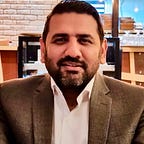MOTHERLAND
My heart gulped as the month of September started this year. It has never happened in the past forty two years since I have been living in this world. Somewhere deep in my heart, I wish the calendar would stop moving forward as it is hard — very hard, to relive some memories from this month last year (September, 2020) when we lost our mother Begum Safia Cheema (Jan. 1, 1944 - Sep. 13, 2020, buried at Yawara Muslim Graveyard, Ibaraki).
May she live happily in the best of the heavens, forever and ever!
Motherland — a place of origin or a country of one’s ancestors, holds a great value for most of the people in this world. An indescribable strength is usually attached to this bond between a person and his or her motherland. People tend to change residencies and citizenships but they stick to the identity of their motherland — something considered very sacred and personal.
Our mother was born and raised in a village near Wazirabad, Gujranwala in Pakistan. After spending quite an eventful and happy life in the cities of Hafizabad and Lahore for over four decades she moved to Islamabad as her health condition started taking away her independence from her, requiring care. Last few years of her life were very challenging due to the rapid setting in of dementia which restricted her movement quite significantly. However, as I recall, I think those were, at the same time, the most beautiful years of her life — especially for me to remember and feel good about being a part of those precious memories. Every day I experienced her true innocence free of any kind of worldly desires and pretentiousness — one of the positive side effects of old age, simply living in the moment.
A life lesson learnt: As and when ambitions get out of our lives or lose value, we actually stand the real ground accepting the reality of our being in the truest sense; and, the most dear and precious things become worthless.
I lived almost my entire life with my parents wherever they lived or I lived, luckily; but, I never heard my mother talk too much about her ancestral connections before her issues with the short term memory and state of dependence. As I was her primary caregiver, spending most of the time listening to her repeated anecdotes, I found her insisting on moving to her village where she could meet her parents, brothers, uncles and cousins. Her forceful insistence would sometimes become hard to handle as neither her village was in the same old shape nor her parents and uncles were there anymore.
When I got posted to Tokyo in 2019, knowing that her cousins and their families had been living in Japan for a long time, our mother got very excited — seeing this as an opportunity to connect with her people. Though the long haul from Islamabad to Tokyo through Beijing was tough on her she drew courage from the hope of this family reconnection.
In Japan, our mother’s first two outings out of Tokyo were going to Tobu World Square, Nikko and Hitachi Seaside Park, planned by her nephews. During these trips, we all very clearly remember, whenever we were passing by Ibaraki my mother would start suggesting that she should be living in that area. She would ask me to rent a place for her and my father in Ibaraki — leaving our chef with them to take care of food, where we could visit them from Tokyo on weekends.
Coincidentally, her last tour outside Tokyo with her cousins and nephews was a visit to Ibaraki Nature Museum. I have very fond memories of our mother from that trip as she was enjoying it fully sitting in her wheelchair and me pushing her around (the photo in the cover of this article is also from the same trip).
At that time, none of us would have even remotely imagined that in just a couple of months she would be lying in peace in a graveyard in Ibaraki — the area where she would always insist on living, close to nature and very close to her own people.
One of my Japanese friends Mr. Takahiro Kon, while consoling at the death of our mother, in all his simplicity, sincerity and kindness, said, “Cheema San, now you have a special connection with our country; with your Oka San (‘mother’ in Japanese language) buried here, Japan has become your MOTHERLAND.”
